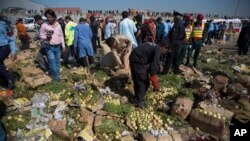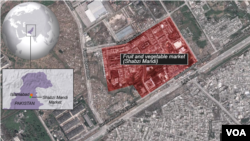Pakistani authorities say at least 22 people were killed and more than 100 wounded in a bomb blast at a crowded market in Islamabad Wednesday.
Police say the bomb was hidden in a crate of fruit and set off by remote control while the market was packed with shoppers and dealers.
A militant separatist group from the ethnic-Baluch community claimed responsibility for the blast in Pakistan's capital. The United Baluch Army said it carried out the attack in retaliation for the military's ongoing operation in the southwestern province of Baluchistan.
On Tuesday, the group said it was behind a passenger train bombing that killed at least 14 people in Baluchistan. The train blast came a day after Pakistani security forces said they killed at least 30 separatist militants during an operation in the Qalat region of Baluchistan. The province has been gripped by a low-level insurgency for decades, with ethnic Baluch rebels fighting for greater control over Baluchistan's natural resources or its secession from Pakistan.
The attack comes as Prime Minister Nawaz Sharif’s government engages the Pakistani Taliban in peace talks to end years of extremist violence in the country. The bombing happened just two days before a Taliban ceasefire is due to expire.
The outlawed Tehreek-e-Taliban Pakistan condemned the attack in a statement as “wrong and against Islamic law”, blaming it on “hidden hands.” While the Islamist group routinely targeted Pakistani security forces, it has in the past also claimed responsibility for bombing schools, market places and other civilian targets.
Speaking to reporters after visiting victims of the blast at the PIMS hospital, Federal Information Minister Pervez Rashid promised the government will bring to justice perpetrators of the market blast. He dismissed suggestions the violence is a setback for peace talks with the Taliban and instead claimed the process has led to a significant reduction in militant violence.
The minister said that the Islamabad attack happened after a long lull in such incidents and for the first time the Taliban has categorically denied its involvement in the attack and strongly condemned it.
Ayaz Gul contributed to this report from Islamabad.
Police say the bomb was hidden in a crate of fruit and set off by remote control while the market was packed with shoppers and dealers.
A militant separatist group from the ethnic-Baluch community claimed responsibility for the blast in Pakistan's capital. The United Baluch Army said it carried out the attack in retaliation for the military's ongoing operation in the southwestern province of Baluchistan.
On Tuesday, the group said it was behind a passenger train bombing that killed at least 14 people in Baluchistan. The train blast came a day after Pakistani security forces said they killed at least 30 separatist militants during an operation in the Qalat region of Baluchistan. The province has been gripped by a low-level insurgency for decades, with ethnic Baluch rebels fighting for greater control over Baluchistan's natural resources or its secession from Pakistan.
The attack comes as Prime Minister Nawaz Sharif’s government engages the Pakistani Taliban in peace talks to end years of extremist violence in the country. The bombing happened just two days before a Taliban ceasefire is due to expire.
The outlawed Tehreek-e-Taliban Pakistan condemned the attack in a statement as “wrong and against Islamic law”, blaming it on “hidden hands.” While the Islamist group routinely targeted Pakistani security forces, it has in the past also claimed responsibility for bombing schools, market places and other civilian targets.
Speaking to reporters after visiting victims of the blast at the PIMS hospital, Federal Information Minister Pervez Rashid promised the government will bring to justice perpetrators of the market blast. He dismissed suggestions the violence is a setback for peace talks with the Taliban and instead claimed the process has led to a significant reduction in militant violence.
The minister said that the Islamabad attack happened after a long lull in such incidents and for the first time the Taliban has categorically denied its involvement in the attack and strongly condemned it.
Ayaz Gul contributed to this report from Islamabad.







